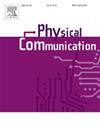高效的极化码硬判决和软判决译码算法
IF 2.2
4区 计算机科学
Q3 ENGINEERING, ELECTRICAL & ELECTRONIC
引用次数: 0
摘要
虽然极化码可以实现容量并在5G标准中采用,但大多数实用的解码器都依赖于软决策。很少有作品考虑有效的硬决策解码。在这项工作中,我们通过利用极性码与Reed-Muller (RM)码的嵌套子码关系,提出了一种基于多数逻辑的硬决策解码器。所提解码器的纠错能力可达到由码的最小距离所决定的理论界限。此外,我们利用非信息位的位置设计了一个复杂性降低机制,并引入了一个验证标准来识别成功的解码结果。基于Kaneko等人提出的方法,我们进一步将硬决策解码扩展为软决策近似最大似然(ML)解码器。为了提高解码效率,采用了一种终止策略,一旦找到预定数量的候选码字,就停止解码过程。仿真结果表明,与现有的极性码软决策算法相比,所提出的解码器在降低计算复杂度的同时达到了接近机器学习的性能。本文章由计算机程序翻译,如有差异,请以英文原文为准。
Efficient hard-decision and soft-decision decoding algorithms for polar codes
While polar codes are capacity-achieving and adopted in the 5G standard, most practical decoders rely on soft decisions. Few works have considered efficient hard-decision decoding. In this work, we propose a majority-logic-based hard-decision decoder for polar codes by exploiting their nested subcode relations with Reed–Muller (RM) codes. The proposed decoder can achieve the error correction capability up to the theoretical bound determined by the minimum distance of the code. Moreover, we utilize the positions of non-information bits to design a complexity reduction mechanism and introduce a verification criterion to identify successful decoding outcomes. We further extend the hard-decision decoding to a soft-decision approximate maximum likelihood (ML) decoder based on the approach proposed by Kaneko et al. To improve the decoding efficiency, a termination strategy is employed, which stops the decoding process once a predefined number of candidate codewords is found. Simulation results demonstrate that the proposed decoder achieves near-ML performance while reducing computational complexity compared to existing soft-decision algorithms for polar codes.
求助全文
通过发布文献求助,成功后即可免费获取论文全文。
去求助
来源期刊

Physical Communication
ENGINEERING, ELECTRICAL & ELECTRONICTELECO-TELECOMMUNICATIONS
CiteScore
5.00
自引率
9.10%
发文量
212
审稿时长
55 days
期刊介绍:
PHYCOM: Physical Communication is an international and archival journal providing complete coverage of all topics of interest to those involved in all aspects of physical layer communications. Theoretical research contributions presenting new techniques, concepts or analyses, applied contributions reporting on experiences and experiments, and tutorials are published.
Topics of interest include but are not limited to:
Physical layer issues of Wireless Local Area Networks, WiMAX, Wireless Mesh Networks, Sensor and Ad Hoc Networks, PCS Systems; Radio access protocols and algorithms for the physical layer; Spread Spectrum Communications; Channel Modeling; Detection and Estimation; Modulation and Coding; Multiplexing and Carrier Techniques; Broadband Wireless Communications; Wireless Personal Communications; Multi-user Detection; Signal Separation and Interference rejection: Multimedia Communications over Wireless; DSP Applications to Wireless Systems; Experimental and Prototype Results; Multiple Access Techniques; Space-time Processing; Synchronization Techniques; Error Control Techniques; Cryptography; Software Radios; Tracking; Resource Allocation and Inference Management; Multi-rate and Multi-carrier Communications; Cross layer Design and Optimization; Propagation and Channel Characterization; OFDM Systems; MIMO Systems; Ultra-Wideband Communications; Cognitive Radio System Architectures; Platforms and Hardware Implementations for the Support of Cognitive, Radio Systems; Cognitive Radio Resource Management and Dynamic Spectrum Sharing.
 求助内容:
求助内容: 应助结果提醒方式:
应助结果提醒方式:


